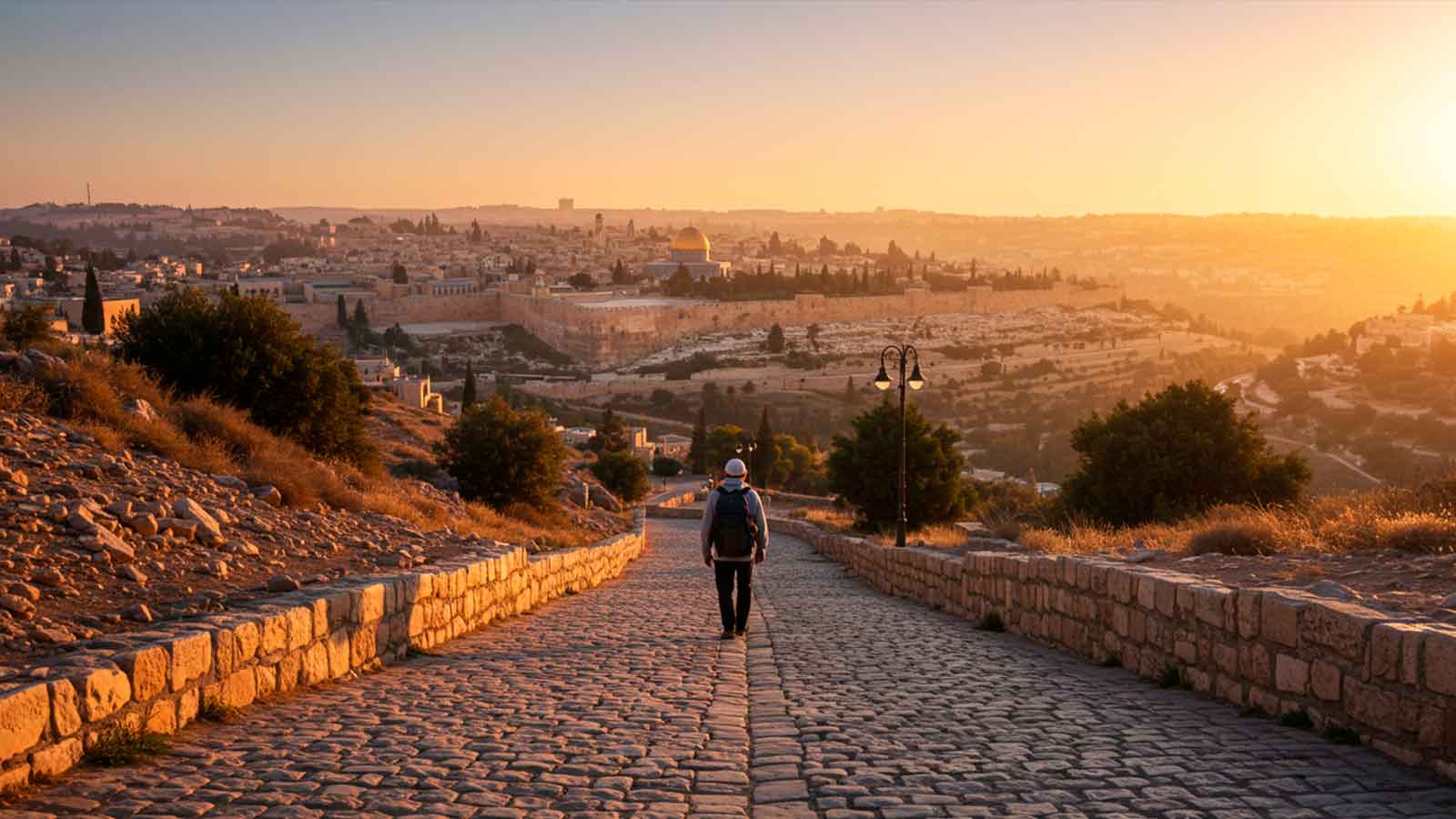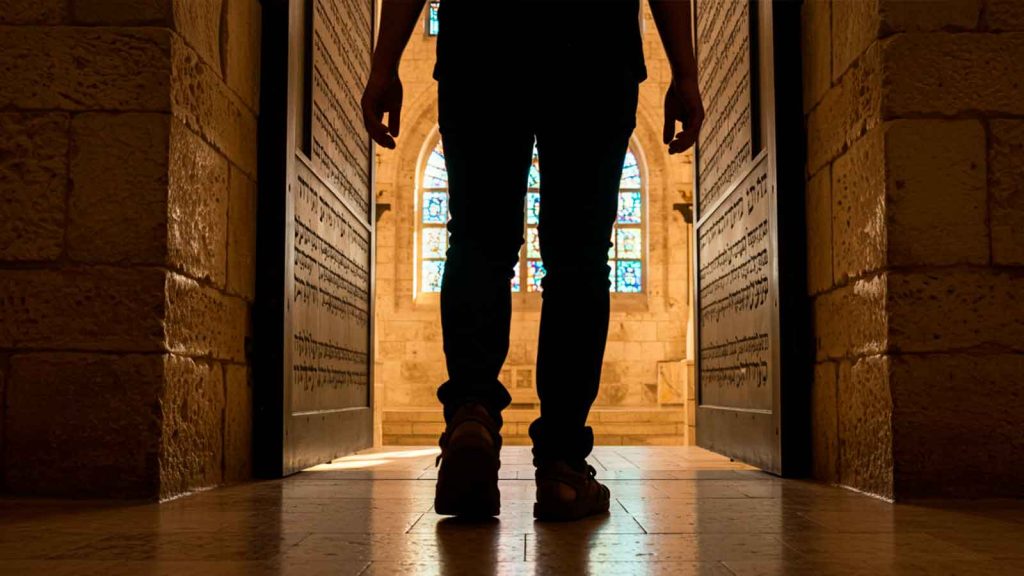Psalm 122 is a song of deep devotion and exaltation, marked by joy and reverence on the ascent to Jerusalem. It is one of the “Songs of Ascents,” recited by pilgrims on their spiritual journey toward the Temple of the Lord. More than a simple poem, this psalm expresses unity, peace, and the delight of being in God’s presence.
In this study, we will dive into its historical context, analyze its spiritual meanings, and reflect on each verse. Psalm 122 teaches us to value fellowship, intercede for the peace of the Holy City, and recognize the privilege of worshiping the Lord.
Complete Psalm 122
¹ I rejoiced when they said to me, “Let us go to the house of the LORD.”
² Our feet are standing within your gates, O Jerusalem.
³ Jerusalem is built like a city that is firmly joined together.
⁴ There the tribes go up, the tribes of the LORD— a testimony for Israel— to give thanks to the name of the LORD.
⁵ For there the thrones for judgment are set, the thrones of the house of David.
⁶ Pray for the peace of Jerusalem: “May those who love you prosper.”
⁷ May there be peace within your walls and prosperity within your palaces.
⁸ For the sake of my brothers and friends, I will say, “Peace be within you.”
⁹ For the sake of the house of the LORD our God, I will seek your good.

Verse-by-Verse Explanation of Psalm 122
Psalm 122:1
I rejoiced when they said to me, “Let us go to the house of the LORD.”
This verse reveals the psalmist’s deep joy on receiving the invitation to worship. The expression “I rejoiced” shows that worship is a desired and delightful experience. Going to the house of the Lord is not a tiring duty but an opportunity for communion with God and His people. Happiness lies in being in the holy place.
Psalm 122:2
Our feet are standing within your gates, O Jerusalem.
This marks the triumphant arrival at the Holy City. The pilgrimage reaches its apex: the faithful are already in Jerusalem, the place where the Lord dwells. Being within the gates is more than physical presence; it is a spiritual state of closeness to God.
Psalm 122:3
Jerusalem is built like a city that is firmly joined together.
The psalmist praises the city’s strong, unified structure. The word “firmly” conveys cohesion, unity, and solidity. This physical image also reflects the spiritual unity of God’s people, gathered as one body to worship Him.
Psalm 122:4
There the tribes go up, the tribes of the LORD… to give thanks to the name of the LORD.
The verse highlights the union of Israel’s tribes in worship. All go up together to Jerusalem, obeying the divine command. This collective action reinforces the importance of gratitude to God and the value of obedience as a living testimony of faith.
Psalm 122:5
For there the thrones for judgment are set, the thrones of the house of David.
Besides being a spiritual center, Jerusalem is also a symbol of justice. The thrones of judgment represent the wise and just leadership promised by God to the house of David—a reminder that the divine presence governs with equity.
Psalm 122:6
Pray for the peace of Jerusalem: “May those who love you prosper.”
This is a call to intercession. Jerusalem’s peace is vital because the temple—God’s dwelling—is there. Loving Jerusalem means loving the Lord’s presence; those who do so will be blessed with prosperity.
Psalm 122:7
May there be peace within your walls and prosperity within your palaces.
The prayer becomes more specific: the psalmist pleads for peace and prosperity within the city. Walls symbolize protection, and palaces represent leadership. Peace in the walls ensures security; prosperity in the palaces secures justice and well-being.
Psalm 122:8
For the sake of my brothers and friends, I will say, “Peace be within you.”
The psalmist shows a fraternal heart. He desires peace not only for spiritual reasons but also out of love for others. Jerusalem must be a safe and harmonious place for all, for there live his brothers and friends.
Psalm 122:9
For the sake of the house of the LORD our God, I will seek your good.
The closing reinforces the main reason for caring for Jerusalem: the Lord’s presence. The city’s well-being is tied to zeal for God’s house. Seeking Jerusalem’s good means valuing the place where God dwells with His people.
Historical Context of Psalm 122
Psalm 122 was written by David and is part of the songs Israelites sang while going up to Jerusalem for religious festivals. The city, besides being the political center, was Israel’s spiritual heart. The psalm celebrates the joy of reaching the Holy City, which represents God’s presence among His people.
Jerusalem as a Spiritual Center
In David’s time, Jerusalem came to be seen as God’s dwelling—the place where the temple would be built. This psalm reflects the collective feeling of worship and the recognition of the city’s spiritual importance.
A Psalm of Fellowship
The text also highlights the unity of the people and the importance of being together in fellowship to worship the Lord. Psalm 122 emphasizes the joy of walking side by side with other believers toward true worship.
Central Themes of Psalm 122
Joy in Worship
The psalm’s opening phrase sets its tone: “I rejoiced when they said to me, ‘Let us go to the house of the LORD.’” The invitation to worship is a cause for celebration, showing that true joy comes from God’s presence.
Unity of God’s People
The psalm speaks of a city “joined together as one,” reflecting Israel’s unity. This image points to the importance of unity among those who serve God.
Peace and Prayer for the Holy City
David ends the psalm with an appeal: “Pray for the peace of Jerusalem.” This shows spiritual awareness of the importance of interceding for the stability and security of the place where God dwells with His people.

Practical Applications of Psalm 122
Valuing Communion with God
Psalm 122 invites us to reflect on how we treat moments of worship. Do we feel joy when we have the opportunity to be in the Lord’s house?
Interceding for the Faith Community
Just as David interceded for Jerusalem, we are called to pray for our communities. Peace, unity, and prosperity are the fruit of a people who pray together.
Seeing the House of the Lord as Life’s Center
Today, the house of the Lord can also be understood as fellowship with Christ. Psalm 122 motivates us to prioritize God’s presence in every area of life.
The Importance of the Songs of Ascents
Psalm 122 is part of the so-called Songs of Ascents—a special collection from Psalm 120 to 134. These psalms were recited by pilgrims ascending to Jerusalem during the great religious festivals. More than travel hymns, they represented a spiritual journey lived with faith, hope, and devotion.
What Are the Songs of Ascents?
The Songs of Ascents were sung during the annual pilgrimages. Israel had to go up physically to Jerusalem, as the city sat on high ground. Thus, the geographic ascent also became a symbol of spiritual elevation.
Each psalm in this series expresses a phase of the journey: cry, repentance, trust, praise, fellowship, and peace.
Psalm 122’s Place in the Journey
Psalm 122 holds a striking position: it is the third in the series and celebrates the arrival in Jerusalem. After the affliction of Psalm 120 and the trust of Psalm 121, here we see the joy of being in the Holy City, Israel’s spiritual center.
It is the point at which the pilgrims’ feet are already “within the gates” of the city—an experience lived with reverence and jubilation.
Pilgrimage as a Symbol of Life
Much More Than a Journey
Going to Jerusalem was not merely a physical displacement. Each step reflected a spiritual quest. The walk represented a process of transformation in which the pilgrim laid aside concerns to focus on an encounter with God.
Application for Today
Although we no longer make that kind of pilgrimage, the Christian life is still a journey. We ascend, symbolically, toward God’s presence every day. Psalm 122 reminds us that we should walk with purpose and joy, certain that our destination is to stand before the Lord.
Worship as the Final Destination
Jerusalem as a Meeting Point
The Holy City represented more than a location. It was the place of worship, sacrifice, and God’s manifestation. The journey’s destination was not merely geographic but profoundly spiritual: to worship God in the temple.
The House of the Lord as Priority
The psalm makes it clear that the temple was the center of everything. Worship was not a detail of the journey but its climax. Psalm 122 shows that true joy lies in coming before God and praising His name with gratitude.
Jerusalem: Unity, Justice, and Peace
A “Compact” City
The psalmist describes Jerusalem as a well-built, solid, united city. This also reflects the unity of God’s people, who ascend together to worship. The city becomes a symbol of a harmonious community.
Place of Just Decisions
Jerusalem housed the thrones of justice, where leaders judged according to divine principles. This reinforces the idea that faith is not separate from justice and that God’s presence promotes order, balance, and truth.
A Call to Intercession
The appeal “Pray for the peace of Jerusalem” shows the believer’s role as intercessor. Loving the city means desiring its peace, prosperity, and faithfulness to the Lord. Whoever loves God’s presence prays for what He loves.

Curiosities About Psalm 122
- It is one of the psalms most quoted in liturgical celebrations because it expresses joy and reverence.
- Jerusalem appears as a symbol of unity and spiritual protection.
- The phrase “tribes of the LORD” emphasizes that every group was part of one whole—one nation before God.
Conclusion
Psalm 122 is an invitation to joy and communion with God. Its verses exalt the importance of worshiping with other believers, seeking peace in the community, and valuing the place where God reveals Himself. Reflecting on this psalm calls us to renew our willingness to travel toward the Lord’s presence with grateful hearts and joyful spirits.
FAQ – Frequently Asked Questions About Psalm 122
What does “I rejoiced when they said to me, ‘Let us go to the house of the LORD’” mean?
This phrase expresses the genuine enthusiasm of someone who loves being in God’s presence. The psalmist celebrates the opportunity to worship in the temple with other believers.
What is the central theme of Psalm 122?
The main theme is the joy of worshiping God in community, emphasizing the unity of the people and the importance of peace in Jerusalem.
Why should we pray for the peace of Jerusalem?
Because Jerusalem represents God’s presence. Praying for it is an act of love and spiritual commitment to God’s people.
Is Psalm 122 still relevant today?
Yes. It invites us to communion, worship, and intercession, reinforcing the value of unity and the pursuit of peace in faith communities.
READ ALSO:
- Psalm 121: Trust that Sustains the Journey
- Psalm 120: A Cry for Peace and Truth in Times of Conflict
- Psalm 117: Universal Praise for God’s Faithfulness
FOLLOW US ON FACEBOOK